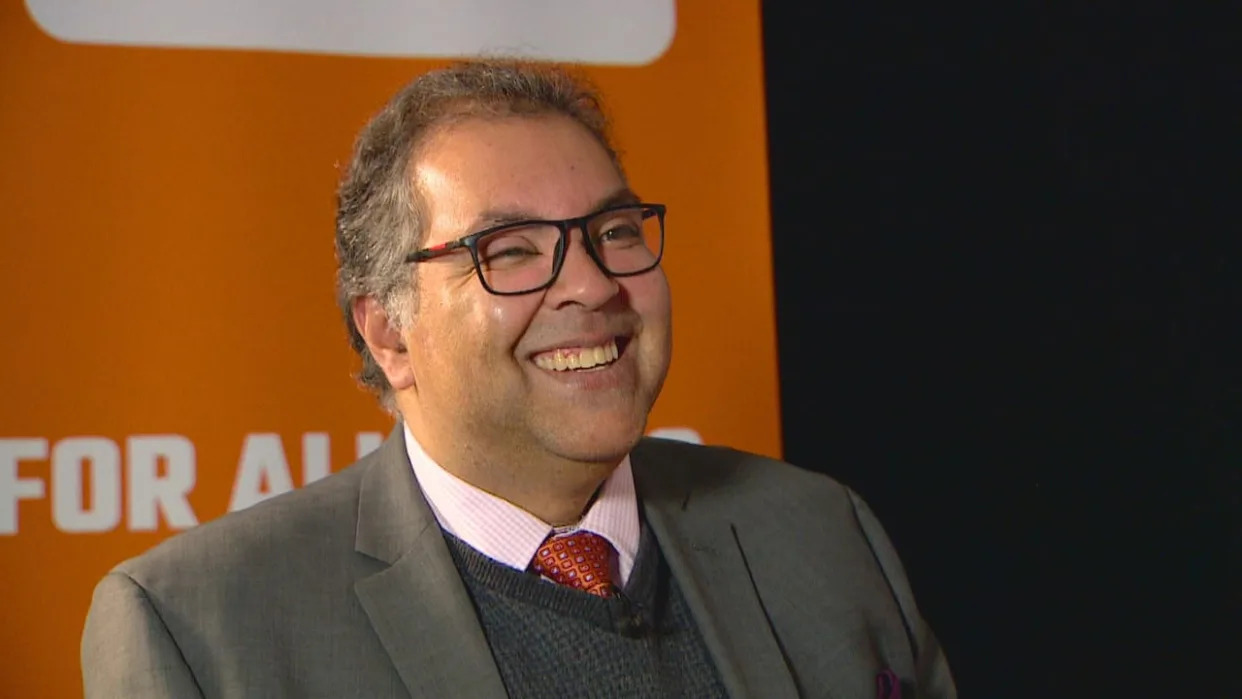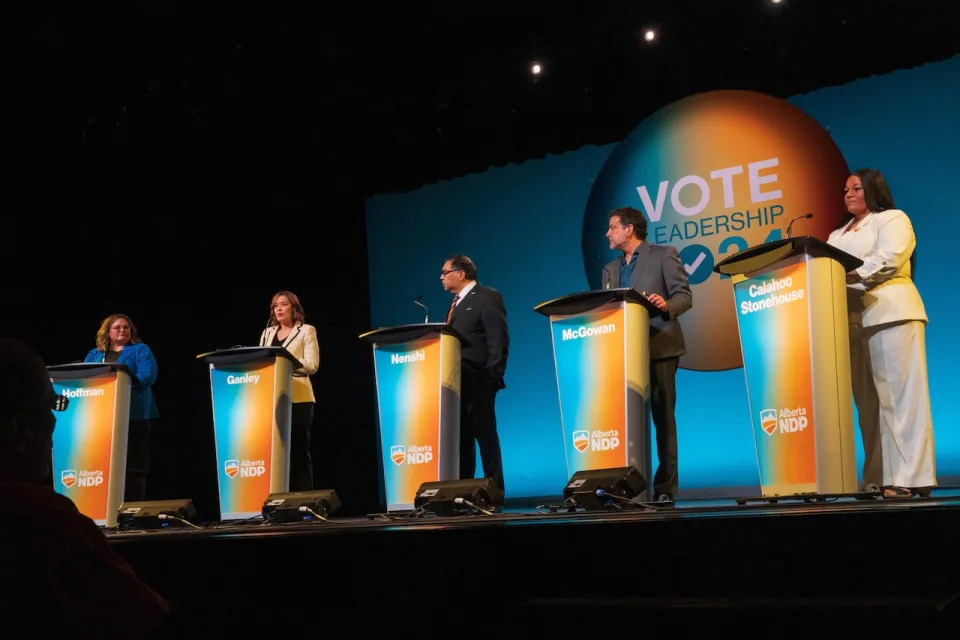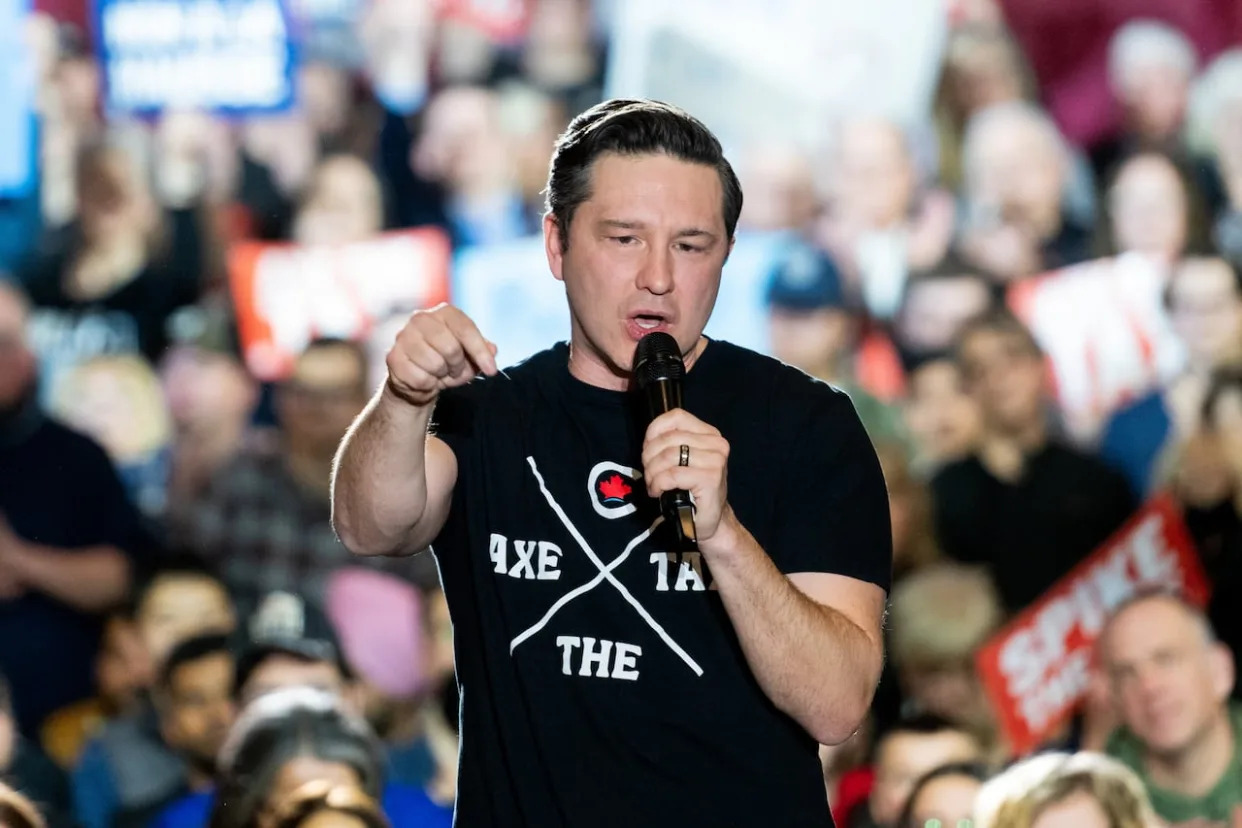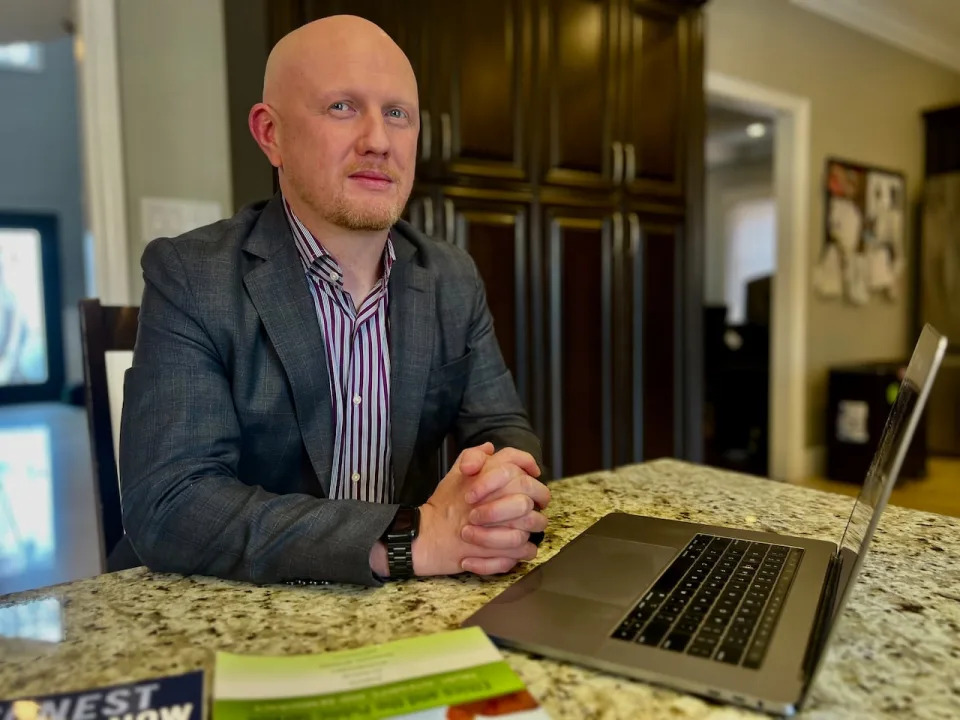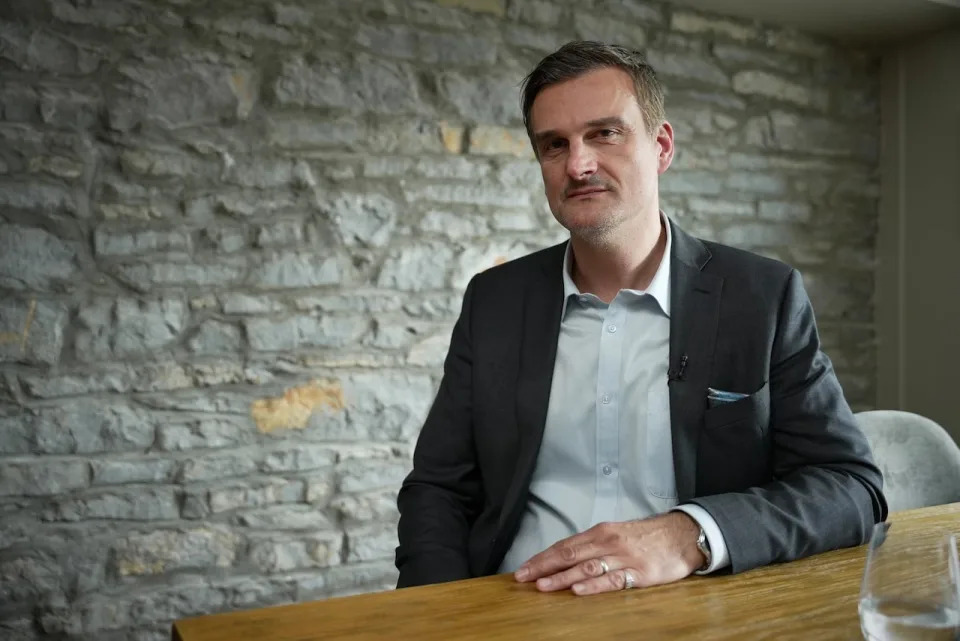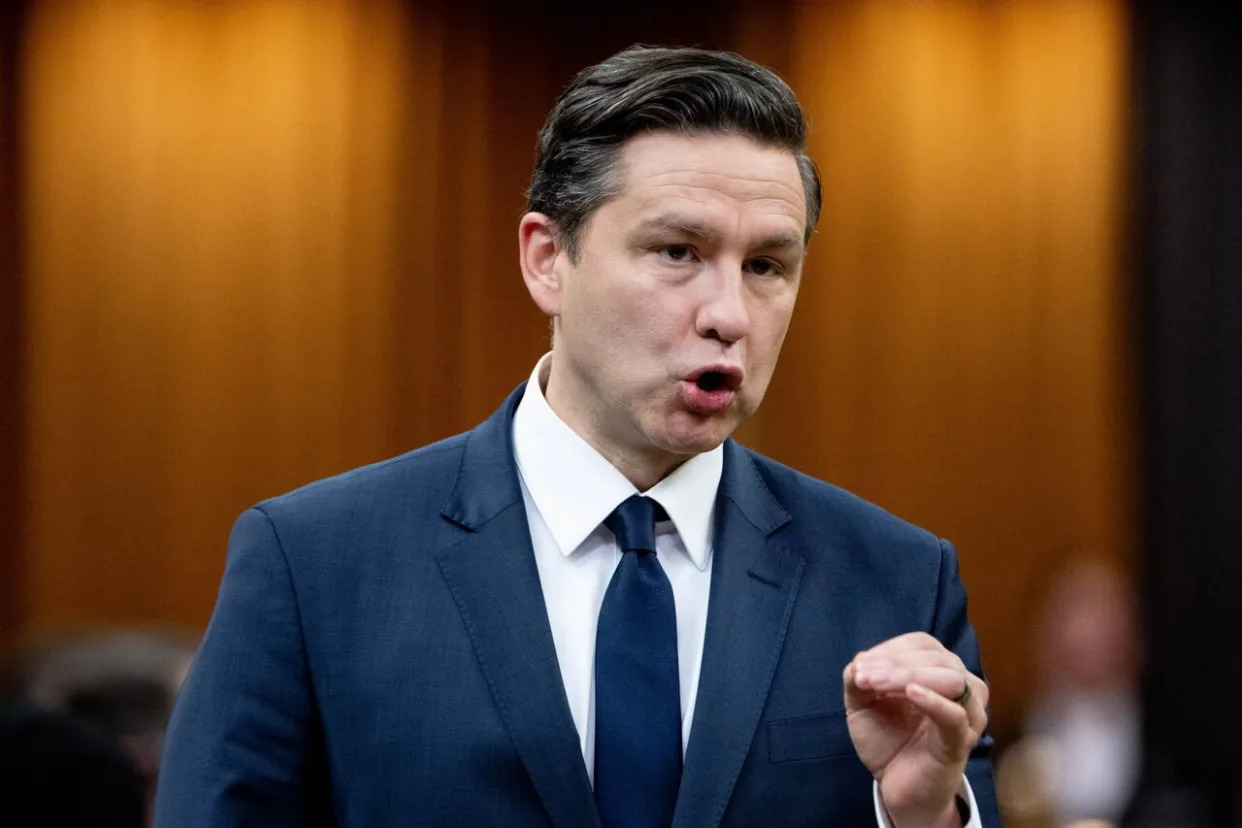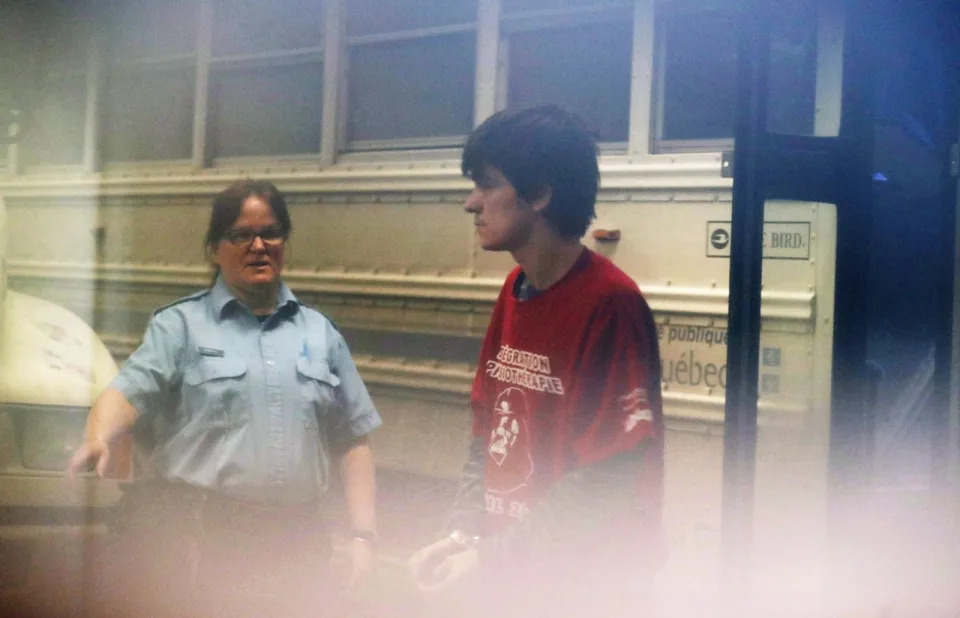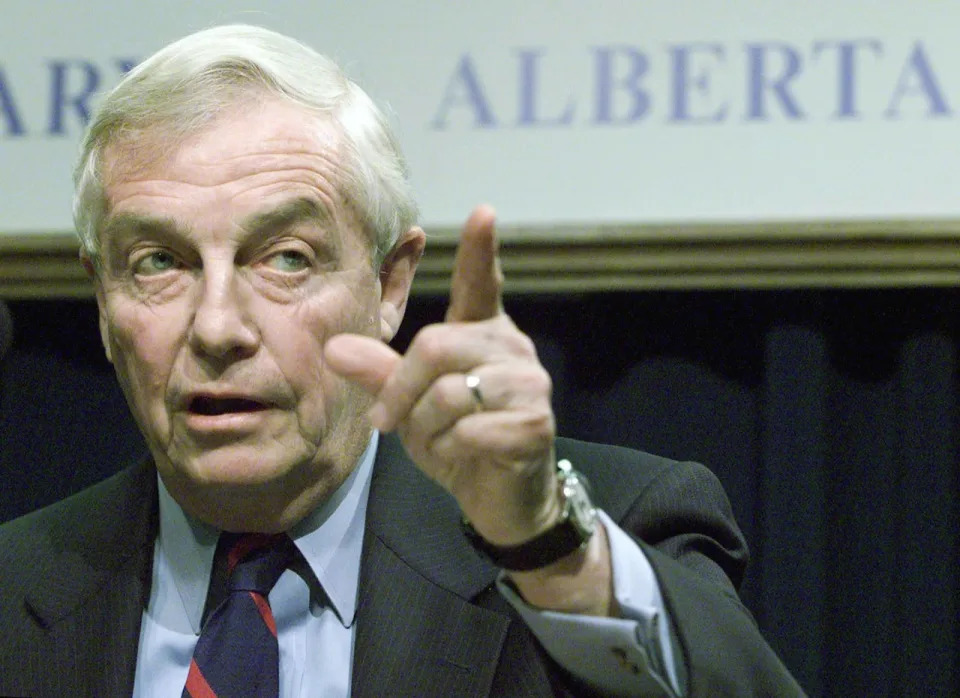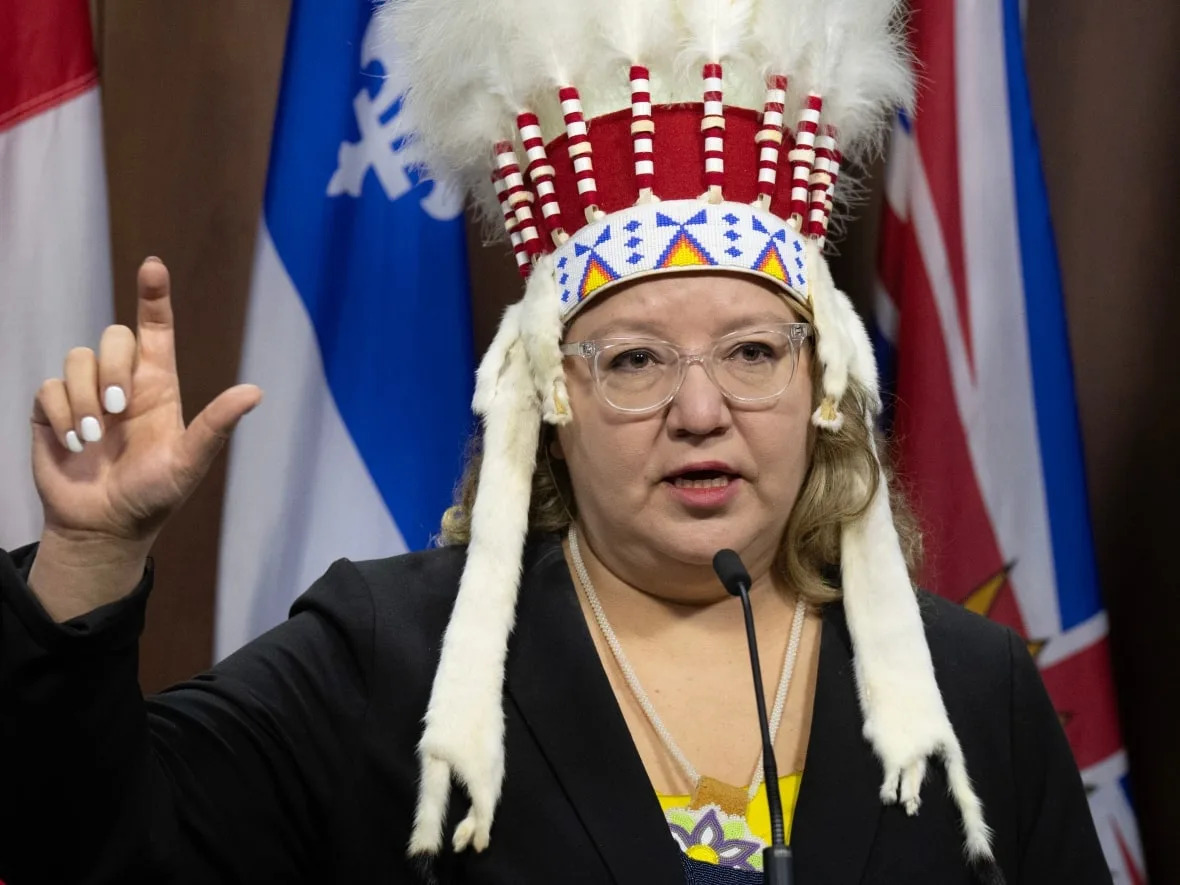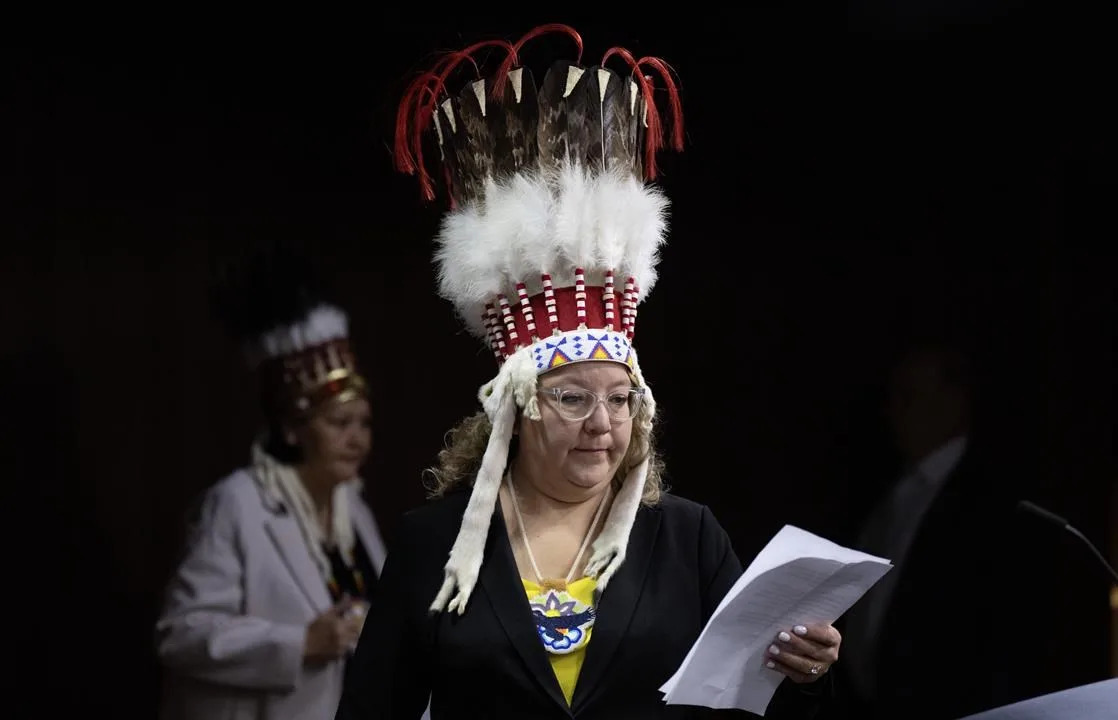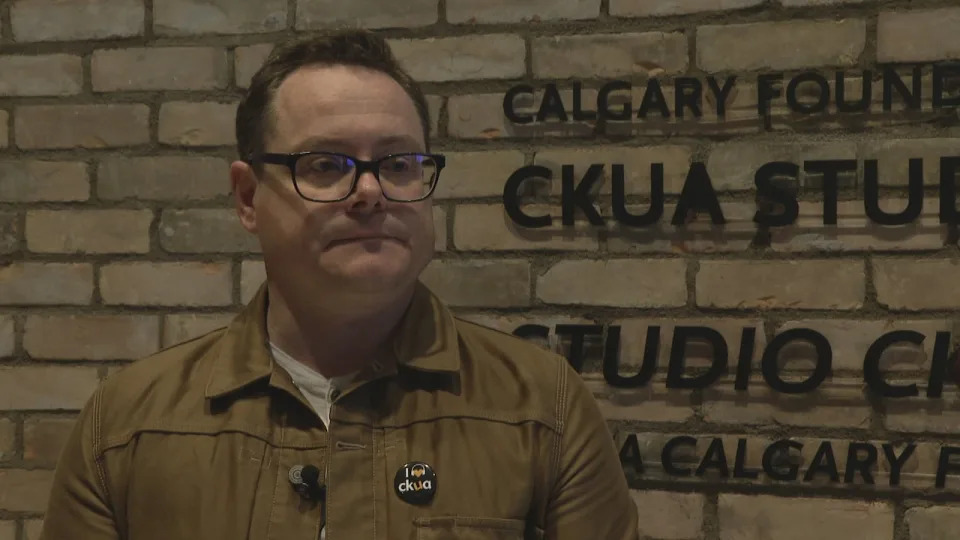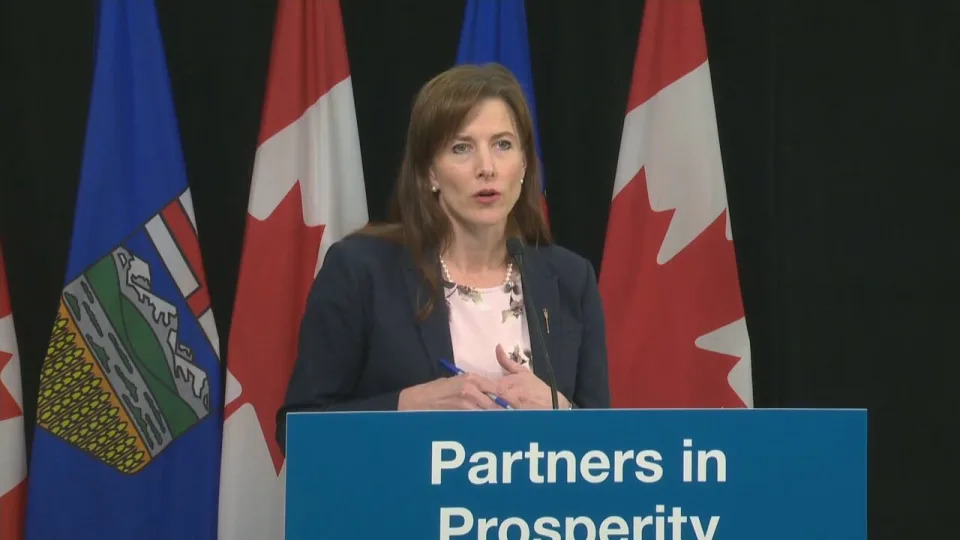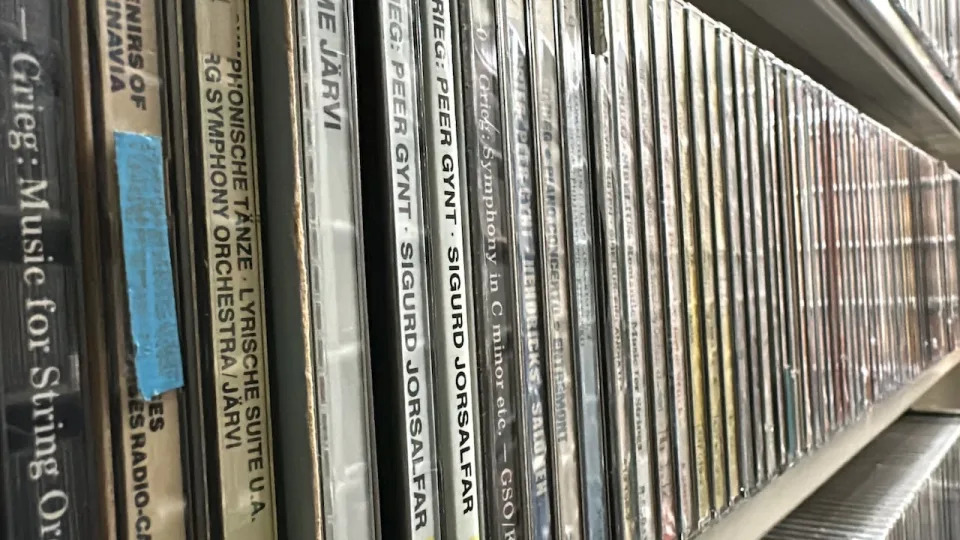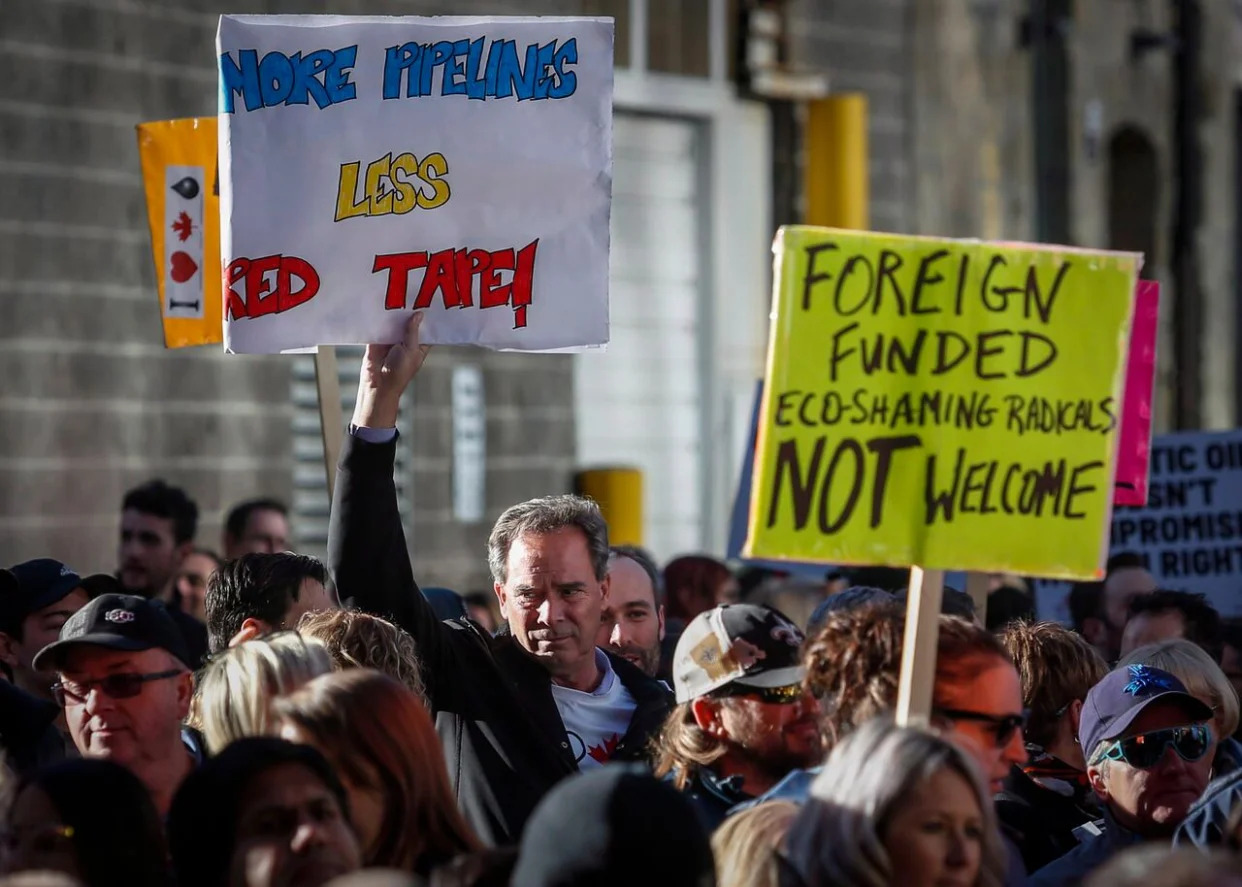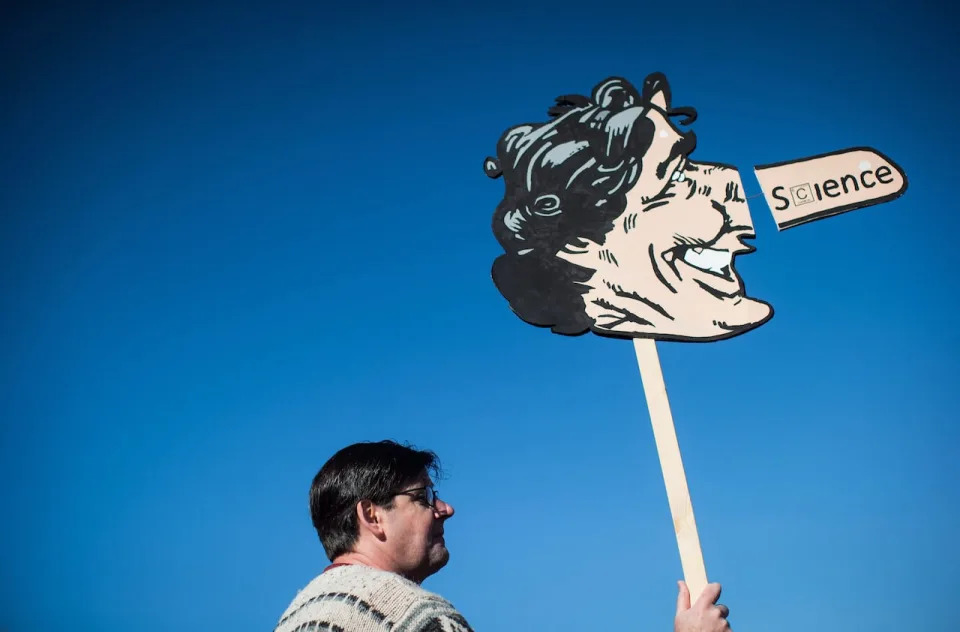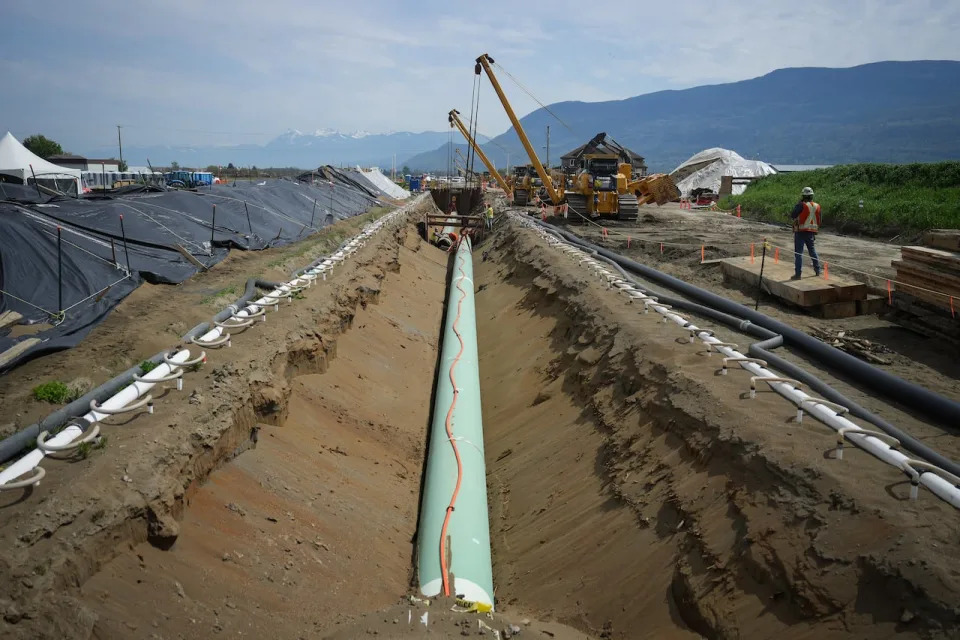CBC
Sat, May 11, 2024
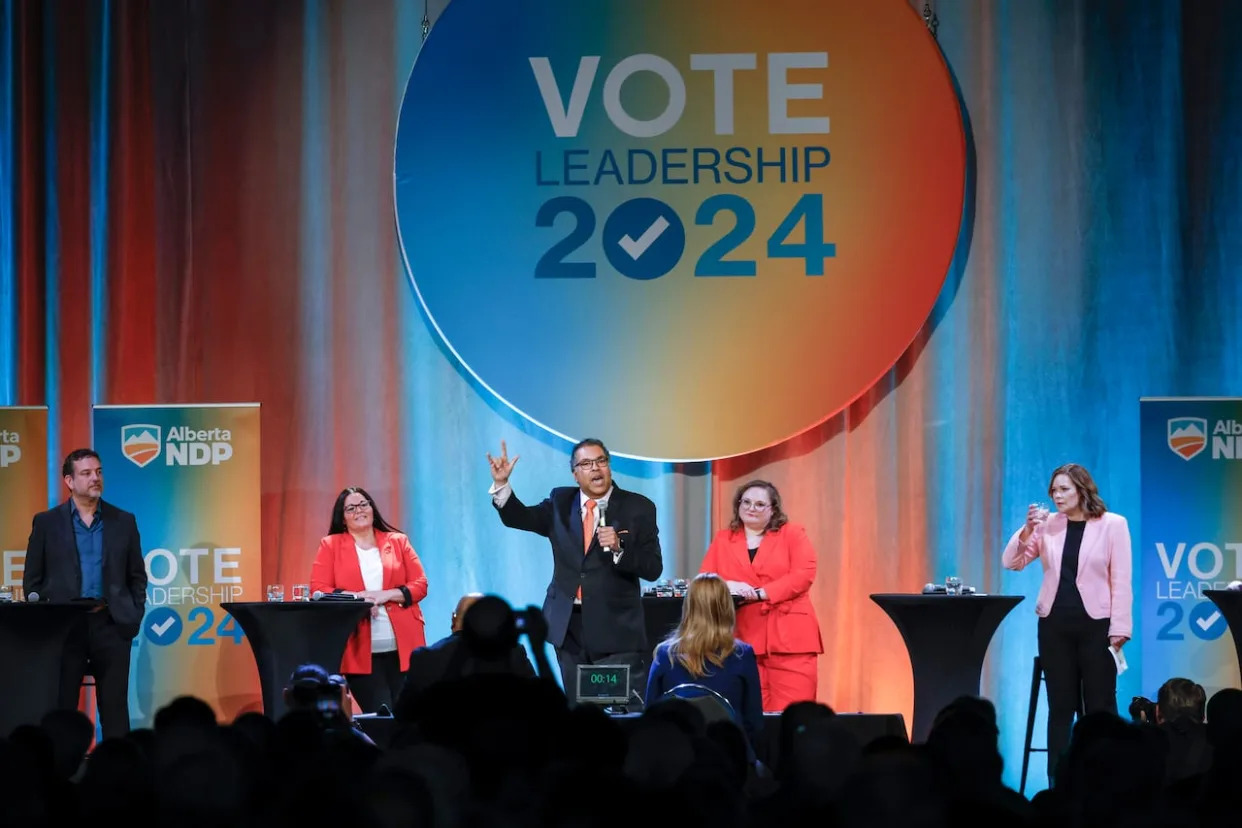
Alberta NDP leadership candidate Naheed Nenshi, centre, makes his closing statement at a Calgary forum as fellow candidates, left to right, Gil McGowan, Jodi Calahoo Stonehouse, Sarah Hoffman, and Kathleen Ganley look on. (Jeff McIntosh/The Canadian Press - image credit)
When there are reports of physical contact among participants at a political debate, it's typically because something ugly has happened.
Unless, that is, it's an NDP leadership debate.
At the Alberta party's candidate forum on Saturday, rivals Jodi Calahoo Stonehouse and Gil McGowan weren't sure which one was supposed to speak first, nervously giggling about it. Once the confusion was resolved, they hugged, before profusely agreeing with each other about raising Alberta's minimum wage and the importance of unions.
These are, as Calahoo Stonehouse explained afterwards, all members of the same party, who broadly share the same progressive values.
They all oppose most of what the Danielle Smith-led UCP does, and after a successor to longtime NDP Leader Rachel Notley is chosen, they'll all remain prominent senior members of the same team — barring the sort of major party fracture that pundits often speculate about in the wake of a new leader's selection, but seldom materializes.
The niceties and touchy-touchy good vibes can go away when there's disagreement over who really belongs in the party or is well-suited to lead it. Take, for example, one testy exchange between former health minister Sarah Hoffman and Naheed Nenshi about the ex-mayor's past.
The battle of Midfield
Hoffman reached back more than six years to hit Nenshi over the closure of the city-owned Midfield Mobile Home Park last decade, to make way for a larger residential community.
"What I need to know from you Naheed: why you closed that park, why you evicted those folks," Hoffman said. She added that she'd spoken to some former residents, and they're still dealing with mortgages and one former mobile home-owner had to move in with his in-laws.
It was a departure from the question about expanding the party while remaining true to its values. Or was it?
Nenshi replied by calling them "so-called affordable homes," and said the residents were prioritized for Calgary Housing Company affordable rentals. He said Hoffman was "fear mongering."
"As the minister of health, Sarah, you should know that sometimes the easy answers are not the easy answers," he said.

NDP leadership candidate Sarah Hoffman criticized Nenshi for the closure of a city-owned mobile home park that occurred when he was Calgary mayor last decade.
NDP leadership candidate Sarah Hoffman criticized Naheed Nenshi for the closure of a city-owned mobile home park that occurred when he was Calgary mayor last decade. (Jeff McIntosh/The Canadian Press)
The sense Nenshi is the front-runner gets amplified when nobody is dredging up controversial decisions from Hoffman's past, or former justice minister Kathleen Ganley's, or McGowan's as a labour leader. (Calahoo Stonehouse is a first-term MLA.)
McGowan used one of his debate segments to bring up the 2019 letter Nenshi sent the UCP government about altering the city union's collective agreement, which several candidates used to attack the ex-mayor as anti-union earlier in the week. Nenshi bid to be more genial in this defence, saying that he was only bringing forth the position of what he called a "super-right-wing council" five years ago, and that he's a strong supporter of organized labour.
A question bubbling underneath this leadership race: how passionate about organized labour is the NDP base in 2024, newly enlarged by the race itself?
On Sunday, the party will reveal the number of members eligible to vote for leader, and sources have told CBC that it surpasses 85,000 — several times greater than what it was at the point Notley announced her resignation in January.
Insiders also say that the lion's share of members are Calgarians, the town of Nenshi and Ganley. That's a massively new orbit for the Alberta NDP, which had its core in Edmonton in the Notley years and in the decades before it.
"You have two camps actively selling memberships in Calgary, and they are doing a very good job of that — and I think it means something phenomenal for our party," Ganley told reporters after the debate.
She tried to differentiate herself from her fellow Calgarian by saying the party needs a leader who does more than hurl insults at Smith's party. (Nenshi drew UCPire Saturday for calling them the "monkeys on the other side" during a discussion about question period in the legislature.)
More than 1,000 people attended the debate at Stampede Park, and Nenshi consistently garnered the most applause.
McGowan, who's led the labour movement for more than two decades, said he's not sure the newly enlarged NDP membership will be as passionate about organized labour rights as it used to be.
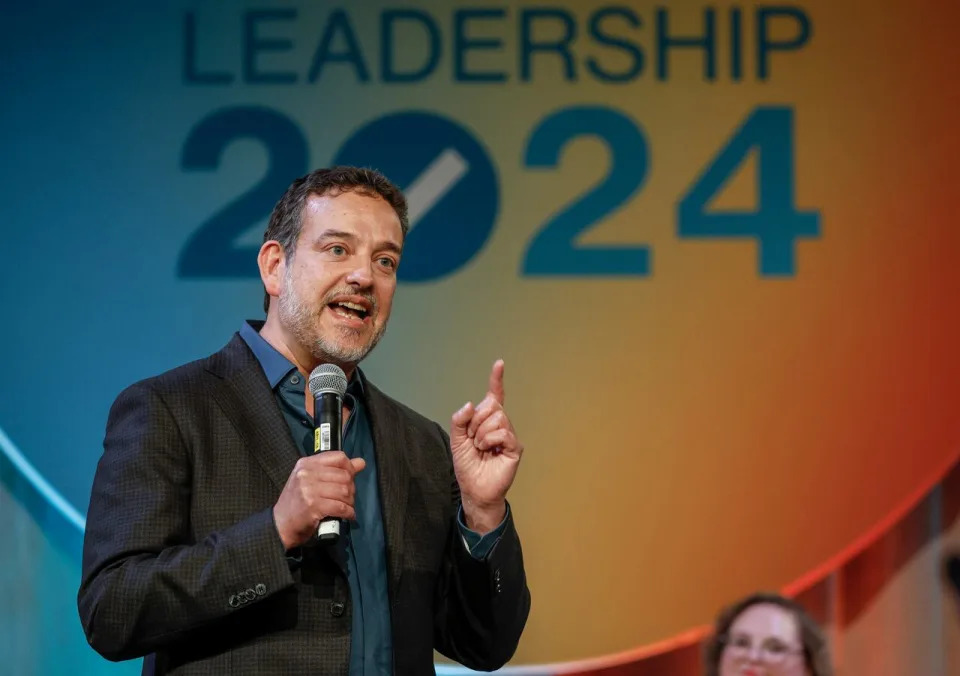
Gil McGowan took aim at a past letter Nenshi wrote as Calgary mayor about weakening the city unions' rights. After the debate, the longtime Alberta Federation of Labour president said he's not sure if the new membership of the party is as ardent on labour rights as it traditionally has been.
Gil McGowan took aim at a letter Naheed Nenshi wrote as Calgary mayor about weakening the city unions' rights. After the debate, the longtime Alberta Federation of Labour president said he's not sure if the new membership of the party is as ardent on labour rights as it traditionally has been. (Jeff McIntosh/The Canadian Press)
In past Alberta NDP eras, the slightest whiff of union-busting posturing would be fatal to the party's card-holders, especially for a leadership hopeful.
McGowan also wonders, he said, how well this party will do with the province's blue-collar and non-university-educated voters, a group that the UCP has won over.
At the outset of the forum, he asked attendees to stand if they had university degrees. The vast majority did — leading him to stress the uphill battle the NDP has with people who aren't like that crowd.
In the last election, 44 per cent of voters gave the New Democrats a proverbial hug, more than voted for them in their 2015 victory. But they fell 8.5 percentage points and 11 seats behind Smith's UCP.
It's undeniable that the next NDP leader's key task will be to make up that gap in the 2027 election. It's not clear at this point how easily the contest's victor will become part of the party's hugging brigade, but that may depend on which priorities this party's membership is keen to wrap their arms around.
Alberta NDP debate marked by agreement, until it came to Nenshi's record
The Canadian Press
Sat, May 11, 2024

EDMONTON — The second official Alberta NDP leadership debate saw five candidates eagerly agreeing with each other, until Naheed Nenshi was forced to defend against more attacks on his record as the mayor of Calgary.
Alberta Federation of Labour President Gil McGowan, who is among the candidates vying for the helm of Rachel Notley's Opposition party, asked why the former mayor signed a letter in 2019 asking the United Conservative Government to sidestep union agreements.
The unearthed letter drew fire this week from Nenshi's rivals who suggested it signalled the presumed frontrunner was anti-union.
"How is this not a trust-buster?" McGowan asked during the event at BMO Centre in Calgary on Saturday.
Nenshi, who served as Calgary's mayor from 2010 until 2021 when he announced he would not seek another term, reiterated that he was at odds with a right-wing council at the time and his efforts actually subverted the privatization of city services.
"I would never rip up a collective agreement. Collective bargaining is sacrosanct," he told the crowd.
Calgary MLA Kathleen Ganley, Edmonton MLAs Sarah Hoffman and Jodi Calahoo Stonehouse round out the list of candidates seeking to replace Notley, who announced in January she would step aside when a new leader is chosen.
Nenshi's status as the newcomer to the party, and relatively vague platform promises, have opened the door to questions about where he stands on key issues.
Meanwhile, the former mayor has been presenting a case to broaden the party's appeal to beat Premier Danielle Smith's United Conservatives in the 2027 election.
Shortly after Nenshi threw his hat in the ring, former candidate Rakhi Pancholi said she saw the memberships Nenshi had attracted, and dropped out of the race to join his team.
Hoffman, the former health minister and deputy premier during Notley's government, has appealed to the party's roots, and trumpeted herself as an “unapologetic" New Democrat.
On Saturday, Hoffman asked Nenshi why people were "evicted" without proper compensation from affordable housing units in Calgary during his tenure in 2017.
Nenshi said Hoffman didn't know the details, and suggested she was fearmongering.
"We ensured that every single tenant who was there had the opportunity to move into a Calgary Housing home with priority and every single one of them who needed to be rehoused in a better place got that better place," he said.
"Sometimes you've got to sit with people and find solutions for each individual rather than relying only on your ideology," he said.
Hoffman also took aim at Nenshi's stance in 2015 when he warned then-NDP premier Notley's move to bump wages could impact non-profit agencies and small businesses.
"There was at least one candidate on this stage who actually fought against the increased minimum wage, and that breaks my heart," Hoffman told the crowd.
Because of the debate format, Nenshi was unable to immediately respond.
Ganley, the former justice minister, focused on the importance of winning the next election with better economic policy platforms than the ruling UCP.
"Without them, all we are left with is anger and big personalities -- and we know that won't be enough," said Ganley.
Calahoo Stonehouse has been focusing her campaign on strengthening water protection, and said the province needs to renegotiate its oil and gas royalties.
McGowan capped his debate performance off in his closing statement with a plea for donations.
"If I don't raise another $50,000 soon, I'm toast."
The party counted just over 16,000 members as of Dec. 31, but sources have told The Canadian Press the total number could now be more than 85,000.
Another debate is scheduled for Edmonton next month, and the party will announce the new leader June 22.
This report by The Canadian Press was first published May 11, 2024.
Lisa Johnson, The Canadian Press
